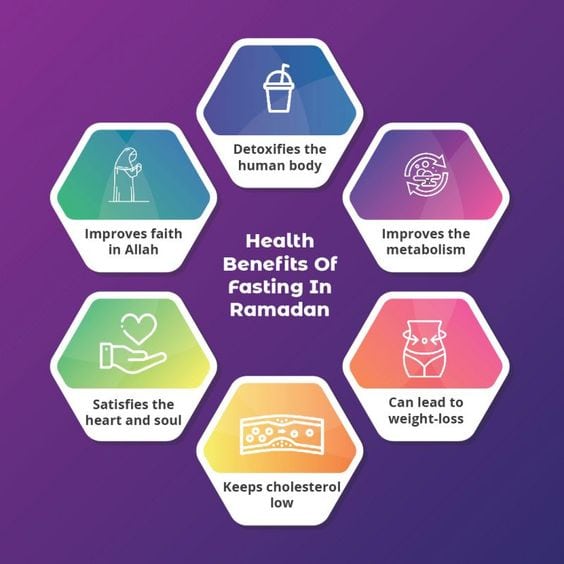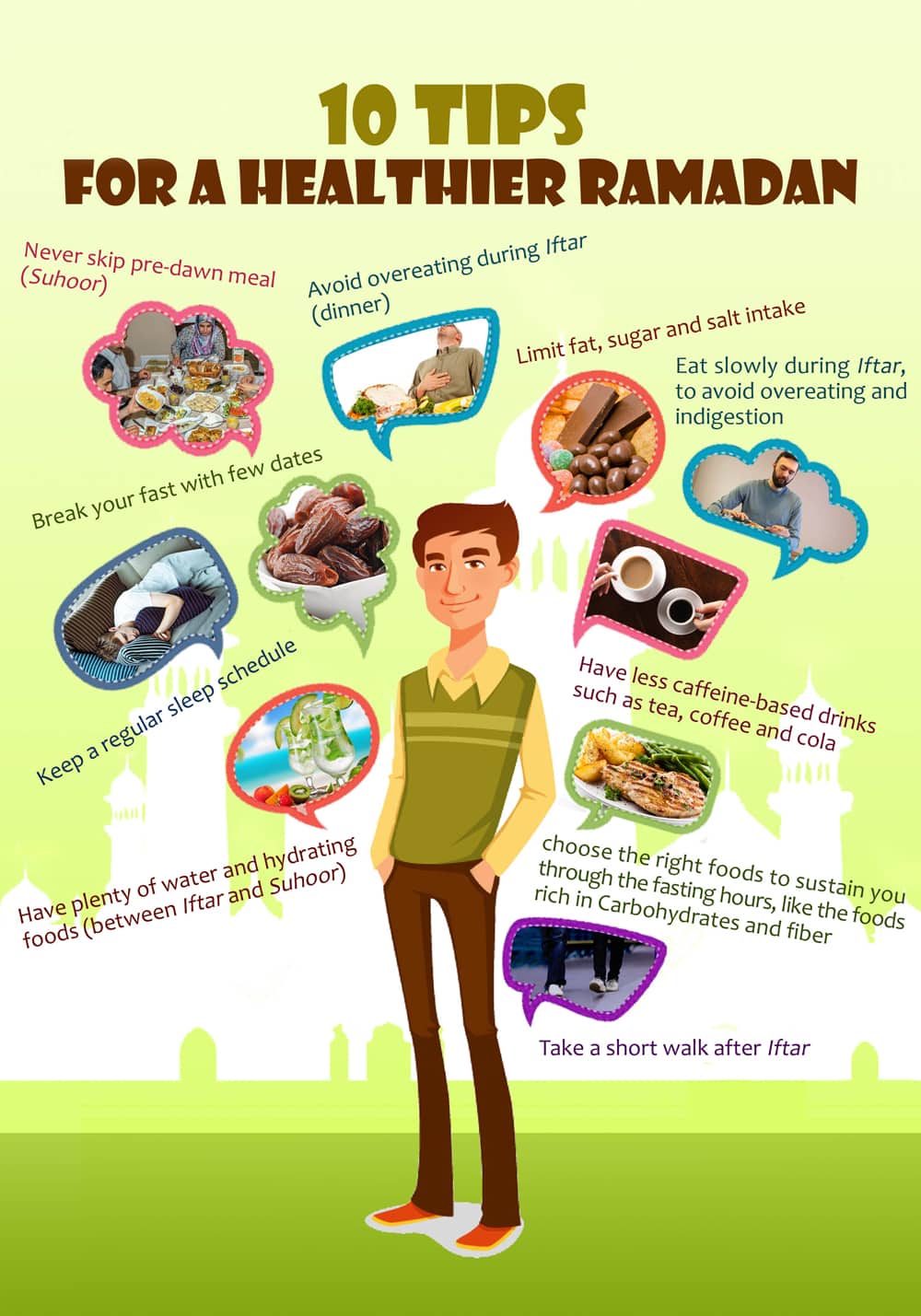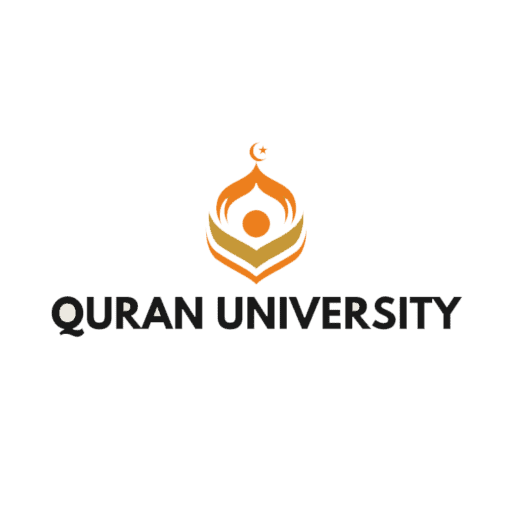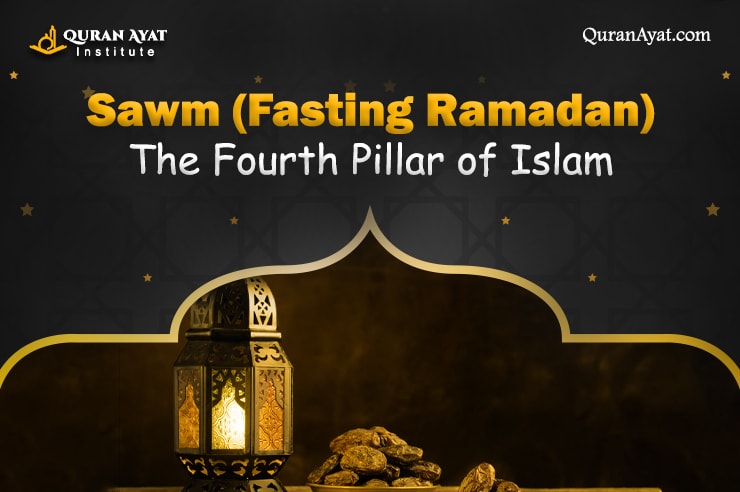Among the 5 pillars of Islam, Sawm (fasting during Ramadan) is the fourth pillar of Islam and unique worship that Muslims observe from year to year.
In this article, we’ll learn about the fourth pillar of Islam, the importance & benefits of fasting, and who is excluded from the fasting obligation in Ramadan?
What is the fourth pillar of Islam?
“Sawm” or “Siyam” which refers to the fasting during the month of Ramadan is the fourth pillar of Islam. It is obligatory for all Muslims at puberty except for some cases that we’ll mention later in this article.
Sawm means abstaining from many things every day in Ramadan month from the dawn (call for Al-Fajr Prayer) to sunset (call for Al-Maghrib Prayer), such as food, drink (including water), medication, any acts of evil, any sexual activity, backbiting, harming oneself or others, smoking, intoxication, impure thoughts, etc.
Every night, before a new fasting day starts, Muslims must have the intention to fast. The intention does not have to be pronounced, because, in reality, it is an act of the heart, which does not involve the tongue. It will be fulfilled by one’s intention from the heart to fast, obeying Allah’s (SWT) commands and seeking forgiveness & salvation.
The holy month of Ramadan, the ninth month in the Islamic calendar is a very unique month. Of course, it’s the month of when fasting obligation is fulfilled but also it’s the month when the Quran was revealed upon our beloved prophet Muhammad (PBUH). Accordingly, Muslims are expected to put more effort into following the teachings of Islam by refraining from all obscenities and doing more good deeds such as learning Quran and perform sunnah and nafl prayers.
Importance of Fasting
“Sawm” or “Fasting” reminds Muslims of the teachings of the Qur’an because the whole Qur’an is usually recited throughout this month. It unites them because they are all fasting together and break the fast together. It makes them focus on their faith and stops them from making the desires of the body more important than worshiping Allah (SWT).
Benefits of Sawm (Fasting During Ramadan)
The benefits of Sawm (Fasting During Ramadan) are so many whether physically, mentally, or spiritually. Some of these benefits are:
- Fasting Cleanse The Soul
Fasting is a great time to remember the spiritual connection we have to our physical bodies. Without the toxins we put in our bodies, we not only give our bodies a break from the digestive process, but we also allow our spirits to be detoxed. - Fasting Helps in Losing Weight
One of the greatest advantages of fasting as a means of losing weight is that it is more effective in burning through fat cells compared to regular dieting. Fasting also burns through fat cells without affecting your muscle tissue, which is why many athletes use fasting as a means of achieving low body fat percentages prior to competitions. - Fasting Improves Insulin Sensitivity
Fasting has shown to have a positive effect on insulin sensitivity, allowing you to tolerate carbohydrates (sugar) better than if you didn’t fast. A study showed that after periods of fasting, insulin becomes more effective in telling cells to take up glucose from the blood. - Fasting Speeds Up The Metabolism
Intermittent fasting gives your digestive system a rest, and this can energize your metabolism to burn through calories more efficiently. If your digestion is poor, this can affect your ability to metabolize food and burn fat. Intermittent fasts can regulate your digestion and promote healthy bowel function, thus improving your metabolic function. - Fasting Improves Your Brain Function
Fasting has shown to improve brain function because it boosts the production of a protein called brain-derived neurotrophic factor (BDNF). BDNF activates brain stem cells to convert into new neurons and triggers numerous other chemicals that promote neural health. This protein also protects your brain cells from changes associated with Alzheimer’s and Parkinson’s disease.

10 Tips for Healthier Ramadan (infographic)

Mentions of Fasting in Quran & Hadith
Due to the importance of Sawm (Fasting), it was mentioned many times in the Quran & Hadith.
Mentions of Fasting in The Quran
O you who have believed, decreed upon you is fasting as it was decreed upon those before you that you may become righteous –
The Holy Quran [2:183]
Indeed, the Muslim men and Muslim women, the believing men and believing women, the obedient men and obedient women, the truthful men and truthful women, the patient men and patient women, the humble men and humble women, the charitable men and charitable women, the fasting men and fasting women, the men who guard their private parts and the women who do so, and the men who remember Allah often and the women who do so – for them Allah has prepared forgiveness and a great reward.
The Holy Quran [33:35]
The month of Ramadhan [is that] in which was revealed the Qur’an, a guidance for the people and clear proofs of guidance and criterion. So whoever sights [the new moon of] the month, let him fast it; and whoever is ill or on a journey – then an equal number of other days. Allah intends for you ease and does not intend for you hardship and [wants] for you to complete the period and to glorify Allah for that [to] which He has guided you, and perhaps you will be grateful.
The Holy Quran [2:185]
Mentions of Fasting in The Quran
Whoever breaks the fast during Ramadan without an allowance or illness, then if he fasted for all time, his fasting would not make up for it.
Hadith [Book 8, Hadith 42]
By the One in Whose hand my self is, the smell of the breath of a man fasting is better with Allah than the scent of musk.’ He leaves his desires and his food and drink for My sake. Fasting is for Me and I reward it. Every good action is rewarded by ten times its kind, up to seven hundred times, except fasting, which is for Me, and I reward it.’
Hadith [Book 18, Hadith 58]
Who is Excused/Excluded From Fasting in Ramadan?
All Muslims are obligated to Fasting in Ramadan except for some categories/cases as follows;
- Physical/Mental Illness
Those who are too sick are excused from fast during Ramadan till they get recovered. This includes mental illness, physical illness, and those who take medications at a certain time the day. The exemption exists over fears that fasting could make the person’s illness worse or slow down their recovery. - Children/Kids
Children under the age of puberty, normally below fourteen, do not have to fast. If puberty is delayed, fasting is often obligatory after age of 14. - Breastfeeding Mothers
Mothers who are breastfeeding are also exempt from fasting because babies need a lot of nutrition while young. So mothers must eat & drink well. - Pregnant Women
Pregnants are excluded from fasting during Ramadan in order not to cause any harm to the baby. - Menstruating Women
Women with menses (PMS) and postpartum bleeding are excluded from fasting until the period of bleeding ends. - Elderly Who Can’t Bear It
Elderly people who could find fasting too strenuous are also exempt as it could make them ill. However, the elderly person who does not fast is expected to feed a poor person for every day that they broke the fast. - People on Travel
People who are traveling are excused from fasting if they meet certain criteria in which Fasting will be hard to bear, such as the duration and distance of the journey should be such that it falls under the category where prayers are shortened and the intention of travel should not be to settle at the destination.
Actions That Invalidate Or Nullify The Fast
- Eating & Drinking
Of course, if you eat or drink something intentionally while being conscious of fasting, your fast becomes void. - Sexual Intercourse or Masturbation
Sexual intercourse or intentional masturbation invalidates the fast. - Committing an Obscene
If a person commits an obscene while observing the fast such as ascribing something false to Allah (SWT) and the Prophet (PBUH), the fast becomes void. - Remaining in Janabat or Haidh or Nifas till Fajr time
If a person in janabat does not take Ghusi intentionally till the time of Fajr prayers, his/her fast becomes void. - Vomiting
If a fasting person vomits his fast becomes void, though he may have been obliged to do so, on the account of sickness. - Enema
If the liquid enema is taken by a fasting person, his fast becomes void even if he is obliged to take it for the sake of treatment.
What Are The Other Pillars of Islam?
As you may know, there are 5 pillars of Islam. Besides “Sawm”, the other 4 pillars of Islam are:
- The Shahadah (The Profession of Faith)
- Salah (Daily Prayer)
- Zakat (Almsgiving/Charity)
- The Hajj (The Pilgrimage to Mecca)




